‘Ron’ Brooker was born on the 11 March 1923 and came from Brighton in Sussex. He joined The Royal West Kent Regiment on the 11 December 1941 and then volunteered for Airborne Forces and was posted to the 1st Air Landing Squadron, Reconnaissance Corps in early 1943.
He was stationed at Albert Barracks, Gravesend in Kent and remembers spending Christmas Day 1941 picking lead out of the rifle range butts! [1]He was assigned to ‘D’ Troop went to North Africa with the Squadron and took part in the Italian Campaign.
On return to the United Kingdom he was sent on parachute course 123 at RAF Ringway, 2 – 17 June 1944. His instructors comments; “A little nervous, but worked hard. Parachuting good”.
Ron said that ‘Ginger’ Williams was the Driver/Mechanic for ‘D’ Troop in Italy, but got himself ‘busted’ from Lance Corporal to Trooper. So, Ron took over as the Driver/Mechanic, but didn’t get his Lance Corporal out of doing the job! [2]
Extract’s from NEWSLETTER 32 & 68, February 1991 & January 2009.
PART 1.
Regrettably, I had no idea that the Association existed until a few weeks ago. I am a reader at the National Army Museum, through them I learned of your association.
I served (proudly I might add) with ‘D’ Troop, joining just prior to the Squadron’s departure for North Africa.
On Sunday 17 September things went wrong for me right from the time our glider set down. The tail unit just refused to come off, so there was I with Capt Park’s jeep and one other and the Lord only knows where he was! Freddie Gough and Capt Platt arrived on the scene and quickly sent off the two jeeps for ‘D’ Troop use and so I eventually ended up driving Capt. Platt. Don’t ask me where we went as we seemed to come across all three Battalions of the 1st Brigade. In the end we finished up with 2nd Battalion on the bridge. It is common knowledge what happened thereafter.
I suffered a head wound just prior to the end and spent a few days in hospital. In time I visited Camps XIIA, IVB and then VIIF. I had no idea at all of what happened to the Troop and for that matter of the Squadron. I did learn, with sincere deep regret, that Tom McGregor had fallen.
With three other inmates of VIIF, I took a walk, but was again wounded and returned to VIIF.
On my return to England, I was hospitalized and later discharged. I managed to re-enlist after a struggle and served a further 20 years.
PART 2.
To be honest I feel so much has been written about Arnhem there is little to add.
As a result of circumstances I was not with D-Troop where my position was driver/mechanic and I drove Captain.Park’s jeep. Instead I drove Major.Gough, Capt.Platt and Cpl.Dixon to the Bridge.
On the Wednesday [20 September] evening we were told to make our way to the church situated just up the road from our position. On the way, getting over a garden fence, a machine-gun opened up and I fell off the top of the fence convinced I had been shot, again. Inside the church about fifty or so men had gathered all sitting very quietly. The roof was on fire and burning embers fell on us. Outside the large door we could hear Germans talking and laughing. We split up in groups of five and at short intervals left the building. My group came to a huge square with buildings all around, and the still smoldering remains of a building on a centre island. All was very quiet.
As soon as we broke cover, machine-guns opened up from in front and the left. We, now in the open, made a dash for the ruins. One of the lads went down with a wound to the right thigh. We had reached the ruin, but went back for the wounded man and carried him back to the ruin. We lay on the rubble that was still hot; we had nothing to return fire with. Bullets from the fast firing machine-guns came right through the bricks. It was not a happy moment!
We heard someone running towards us, but didn’t raise our heads, it was an officer from the Royal Engineers, a very welcome visitor he quickly decided we had no choice but to pack in. He shouted and waved a more or less white handkerchief. The firing came to a stop. He went forward to speak to the enemy. Shortly after he had spoken to them he called us over. We carried the wounded lad between us. After being searched we lay down on the marble floor, it was cold, hard and very uncomfortable, but almost in minutes I was asleep, the first real sleep I had managed since Sunday morning.
We were awakened around seven the next morning. Our wounded man had gone, just lots of dried blood remaining where he had been. I have no idea what happened to him. A very young German brought me my first cup of ersatz coffee and a crust of bread. He spoke very good English, and told me I was lucky I was now out of it.
Later that morning as we marched to the railway station, I saw so many dead British soldiers, some covered with sheets or blankets by civilians, some with a cover of some sort over the face, others just as they fell. I felt far from lucky, more ashamed that we had been forced to give up. In the distance we could hear heavy gun fire, so we knew that the Division were still fighting. A miserable train journey in cattle trucks delivered us to Stalag 12A at Limburg. A terrible two nights under canvas, then another just as bad very long journey to Stalag 4B at Mulberg. This was a very large and reasonably comfortable camp. We had a theatre, dance orchestra and football teams. Plenty to do, but very little food.
Our next train trip was to work camp 7F at Truglitze, I was now in Poland. It was a small camp, quite comfortable wooden huts, separated in rooms holding two double bunks, we worked in and Breberg oil refinery, mostly filling in bomb craters in adjoining fields, roads, etc. Very hard work, very long hours.
On 24 December two men from the Dorset Regiment, one from the 10th Parachute Battalion and myself took part in a “Great Escape”! In actual fact we just walked off. Our freedom lasted all of ten hours. And I managed to get shot again. I wonder why an epic film was not made of it!
My biggest regret is that I have never been able to talk to, learn about the events elsewhere. As I wrote long ago when I learned about the OCA many years later, I did attend just the one reunion, all the talking was in the past and it was a social event really for families. I sat at the very end of a table with an Army Cadet officer in uniform and a very nice old man about my age. I asked him which troop he had been in, to which he replied he was just a friend of the officer. One very nice lady spoke a few words to me. I quite understood that I was an unknown, but I regret I had no desire to repeat the experience.
I have visited Arnhem, the war graves and tried to cover the area where the battle took place.
After the war Ron went back to live in Brighton and served in the Territorial Army, as a Permanent Staff member, for 15-20 years, serving mostly in the Sussex Yeomanry, retiring with the rank of Captain. As a civilian he drove buses along the South coast area. He moved to Colchester in early 2012.
Ronald James ‘Ron’ Brooker died in Colchester on the 19th September 2019, aged 96.
His Funeral Service was at the Colchester Crematorium on the 21st October 2019.
[1] & [2] Interview with Ron Brooker. December 2013.
Click here to read Ronald's personal account
Created with information kindly supplied by R Hilton
Read More
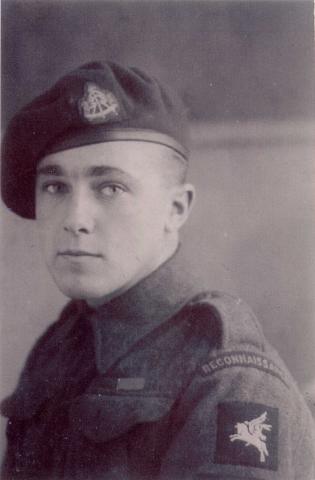
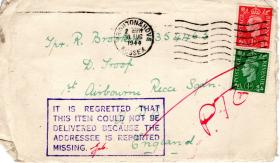
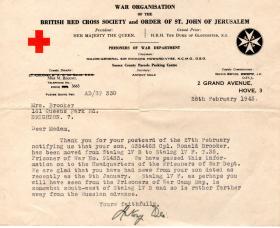
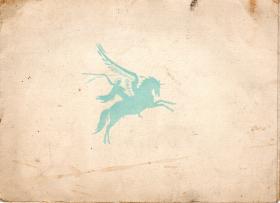
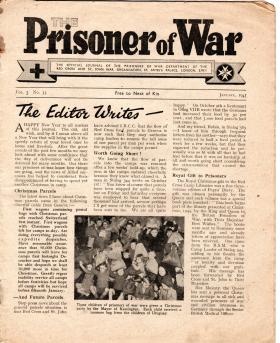
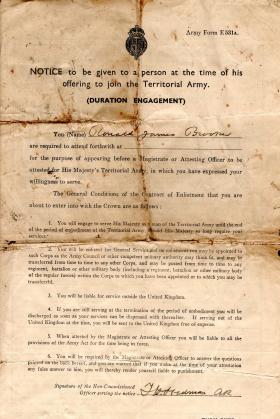
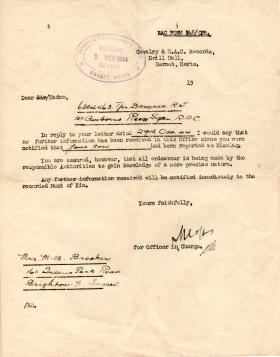
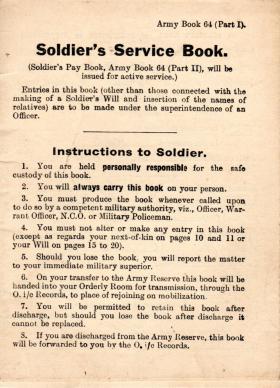
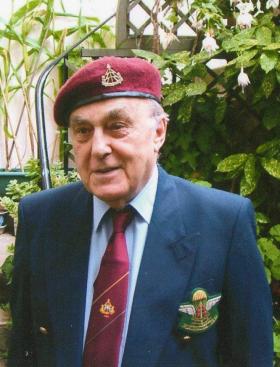
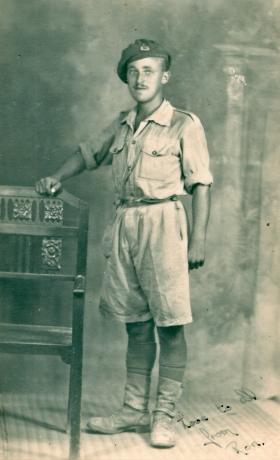
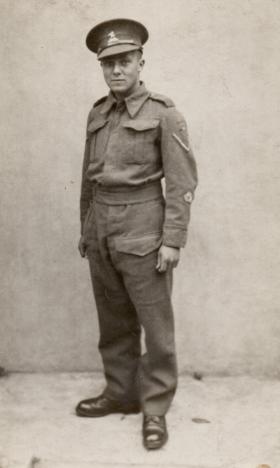
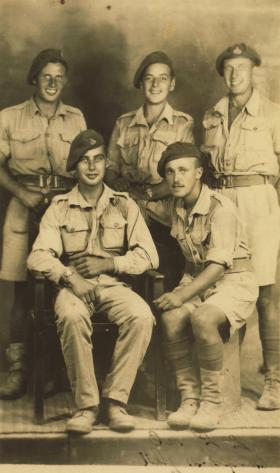
Latest Comments
There are currently no comments for this content.
Add Comment
In order to add comments you must be registered with ParaData.
If you are currently a ParaData member please login.
If you are not currently a ParaData member but wish to get involved please register.